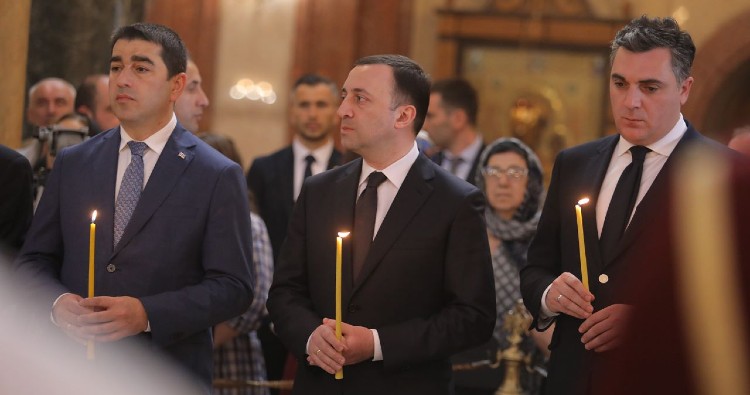PM attends civil funeral of Georgian Constituent Assembly deputy chair Aleksandre Lomtatidze

The remains of Lomtatidze, who died in 1924 in Tashkent after his exile by Soviet Russia, were repatriated to Georgia on May 26 from Uzbekistan, with the involvement of the Georgian Government Administration, Ministry of Foreign Affairs, Tbilisi City Hall and with the support of the country’s Parliament. Photo via Government Administration
Georgian Prime Minister Irakli Garibashvili on Sunday attended the civil funeral of a politician, state and public figure Aleksandre Lomtatidze, the deputy chair of the Georgian Constituent Assembly in the First Republic of Georgia, at the Holy Trinity Cathedral in Tbilisi.
The remains of Lomtatidze, who died in 1924 in Tashkent after his exile by Soviet Russia, were repatriated to Georgia on May 26 from Uzbekistan, with the involvement of the Georgian Government Administration, Ministry of Foreign Affairs, Tbilisi City Hall and with the support of the country’s Parliament.
 Photo via Government Administration
Photo via Government Administration
In his address, Garibashvili praised Lomtatidze as “an active participant” in the restoration of the autocephaly of the Georgian Church and “one of the creators” of Georgia’s independence, highlighting his “worthy work, lifestyle, an embodiment of Georgian spirit and at the same time, a true European”, the Government Administration said.
Lomtatidze, throughout his life fought for the independence of our country [Georgia], [and] for its integration into the European family”, he stressed, adding “with a short but heroic biography”, Lomtatidze had created an “immortal example of service to our motherland, independence and freedom of our country for future generations”.
Garibashvili thanked Georgia’s Ambassador to Uzbekistan Zurab Abdushelishvili and the country’s Government for their efforts in searching for Lomtatidze’s grave in Uzbekistan.
The Senaki and Chkhorotsku Metropolitan Shio Mujiri, who is the Patriarch’s 'locum tenens', held the funeral ceremony and introduced the letter of the Catholicos Patriarch of Georgia Ilia II to the attending audience, including Parliament Speaker Shalva Papuashvili, highest officials of the executive and legislative authorities and representatives of the Patriarchate of Georgia.
Aleksandre Lomtatidze was arrested in 1912 on political grounds and was exiled from Georgia. In 1913 he returned to Georgia and in March 1917 participated in the restoration of the autocephaly of the Georgian Church. He was the first member of the National Council of Georgia and a member of the Transcaucasian Seim.
He signed the Act of Independence of Georgia, adopted on May 26, 1918, and was a member of the Georgian Parliament. Lomtatidze was elected as a chair of the Tbilisi City Council and deputy chair of the Constituent Assembly.
 Photo via Government Administration
Photo via Government Administration
In 1921, after the occupation of the Democratic Republic of Georgia by Soviet Russia, Aleksandre Lomtatidze did not emigrate and remained in Georgia. He was involved in the resistance movement. In July 1921, he was arrested and later exiled. After the anti-Soviet uprising in Georgia in August 1924, Lomtatidze was again arrested in Tashkent, where he died soon after at the age of 42 and was buried there in the city at the Christian cemetery.
 Tweet
Tweet  Share
Share